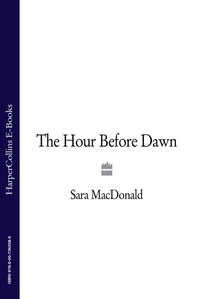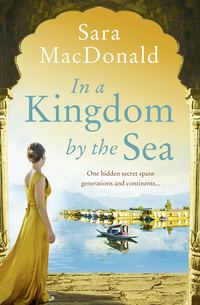
Полная версия
Sea Music
Lucy grins at him. ‘You’ve also got marmalade on your cassock, Barnes. Did you tell me we haven’t got anyone coming in until later today?’
‘Oh, yes. Sorry, Lucy, it’s a training morning or something, I can’t quite remember. Kate is not coming until midday, but Mrs Biddulph has just rung to say she can relieve you at ten o’clock. Is that all right?’
‘Yes, it’s fine. What a pity, I’ll miss Kate again. I’m back at work at twelve o’clock. I’m dying to meet her. What’s she like?’
‘She’s … different – quietly capable, and she drives, thank God. I quailed a touch when I first saw her – nose ring, short spiky hair – but Martha and Fred did not bat an eyelid. Lovely face, rather like a young Audrey Hepburn. I might be wrong, but I’d say she was a bit overqualified to stay long term.’
Lucy raises an eyebrow at him ‘You noticed her then?’
Barnaby gathers up his books filled with small flaglike book marks. ‘Kate is not someone you can avoid noticing.’
Martha emerges from the bathroom, looking stunning in a mustard-yellow dress, a cream scarf and bare legs in tiny smart court shoes.
Lucy claps her hands. ‘Gran, you look beautiful, utterly beautiful!’
Martha smiles at her granddaughter. ‘Darling, thank you,’ she says graciously, throwing Barnaby a baleful look as he heads for the front door.
‘Bye. See you all later …’ Barnaby is out of the front door, galloping gratefully to his car.
Lucy giggles, suddenly deliciously happy again. ‘Tell you what, Gran, put this coat on … there … Now I want you to see your garden – it’s looking stunning – then you can tell me if you are warm enough in those clothes.’
She peers round the bedroom door at her grandfather while simultaneously helping Martha into her coat. ‘Gramps? Are you OK? Barnaby’s just left. Gran and I are just going to have a quick potter round the garden.’
Fred puts his tea cup down. ‘I’m fine, Lucy, thank you.’ He winks at her wryly. ‘I’m going to get up in five minutes. Take your gran up to the copse. The wood anemones are out under the trees … look splendid.’
Lucy and Martha walk across the damp grass. The early sun seems warm, but the wind from the sea is not. Martha holds her coat close as they turn towards the trees where the wood pigeons nest at the far end of the large, overgrown garden.
They both gasp at the sight of the great circular cloud of blue, white and gold lying under the spindly saplings and old sycamore trees. Lucy goes behind Martha to shield her from the cold wind and twines her arms around her neck.
‘Did you plant all those, Gran?’
‘No … Fred planted more and more each year until there was a great carpet of them, which grew and grew. So lovely. Oh, so lovely.’
‘Everything is just coming out. Look at that yellow, and the pink there in the corner near that white prickly bush thing.’
Martha laughs. ‘Quince,’ she says. ‘I think.’ Then suddenly, ‘I don’t want this all dug up for vegetables.’
‘Gran, why ever should it be? Of course not.’
‘It happens.’ Martha shivers, and takes one foot out of her shoe and dips it in the long wet winter grass. Lucy opens her mouth to say she will get cold, then seeing Martha’s face, says nothing.
Martha, leaning against Lucy, closes her eyes, pushes her old toes into the damp grass and for a moment the sharp cold sensation shoots her down the years to another place, another time. She smiles, savouring the birdsong, the flash of new-born, translucent yellow leaves, red flowering camellias, closed bud of cherry. She raises her face to the smell of spring, the first exciting promise of summer, to being young and full of hope, with the whole of life shimmering before her.
‘Gran?’ Lucy whispers after a while. ‘Don’t get cold.’
Martha opens her eyes, expecting to see Hanna, sent by Mama to bring her inside. But it is … it is …? ‘Darling,’ she says, ‘it is a little cold.’
Lucy bends and fits Martha’s small bent toes back into her shoe, and arm in arm they walk back to the house.
Fred is in the bathroom with the radio on and Lucy sits Martha on the bed and, fetching a towel, dries and gently rubs Martha’s feet warm again.
Martha places her hand on Lucy’s silky dark hair with the streaks of gold. ‘Darling, what would I do without you?’ she says. ‘You shouldn’t be doing this for me.’
Lucy looks up and says fiercely, ‘Gran, why not? All my life you have been here for me and now I am here for you.’
Lucy’s eyes fill with tears suddenly and so do Martha’s; for what has been between them and is now gone. Lucy longs to say, ‘Oh, Gran, I found something I wasn’t meant to in the loft. What really happened to you in the war?’ But she can’t. It’s too late. A few years ago, maybe. But not now. The Gran of her childhood is gone for ever, but the person she was is still here, burning with the same unquenchable spirit. Lucy takes Martha’s small hands and holds them to her cheeks for a moment, closing her eyes against her loss.
When she opens them, she says briskly, ‘Right, Gran, I’m afraid it’s woolly tights, passion-killer tweed skirt and shapeless warm sweater for you. You’ve done enough trolloping for one cold spring morning.’
Martha giggles. ‘Oh, darling, it’s so much more fun being a trollop.’
Fred, coming into the bedroom shaved and immaculate in tie and clean shirt, looks at the two women and the array of clothing on the bed and snorts at them.
‘If ever there were a couple of trollops, it’s you two.’
Outside in the garden, the very first bud on the cherry tree opens a fraction and NATO drops a bomb by mistake on a bridge full of Albanian refugees fleeing Kosovo.
Chapter 13
The rain has stopped and the Berlin night is quite still except for the muted sound of traffic out on the autobahn. He wakes in the dark and for a moment believes he is back in his childhood. He can smell the roses from his mother’s garden, but stronger still is the smell of horses and things he does not wish to remember. He can hear his heartbeat loud in the dark and the overpowering silence closes in on him. Why, after all these years, do the memories come flooding back? He has buried the past. He has buried it deep.
That was that life. This is another.
He can remember the first time he saw the little girl clearly. She had long, shiny black hair he wanted to touch. She was tiny, like a little doll, and she was afraid of horses. But she was not afraid of him.
Mutti was furious with his father. She did not want him to go into practice with a Jew, and she stood in the garden that day, unsmiling and icy. She called him to her and whispered loudly, ‘Ugh! How I hate the darkness of them.’
He pulled away from her. Kicked out at a garden chair because of the sickness in his stomach, and the gardener’s puppy lying underneath shot out with a squeal … I shiver at the memory of her eyes. Close my mind against the echo of her laugh.
All his childhood Mutti told him stories, terrible fairy stories of a race who ate their own babies, who were inferior, but a threat to all good Germans. After he met the little girl his heart told him something quite else.
How lonely they were, he and that fearless little girl. There were no other children nearby and only a hedge and a lawn between them. He defied Mutti, refused to think of her as Jewish. He and the girl were friends. They were friends.
Although he was older, she was the one with the imagination. They made small dens in the rambling garden on the edge of the forest, like nests, with old horse rugs and straw as linings against the cold and damp.
They always made more than one den to outwit Mutti. The girl seemed to know exactly where his mother would send the nurse or gardener to look for them, and where, in a tangle of dried fir branches, close under the branches of overhanging trees, grown-ups never ventured, if you stayed very quiet.
He was the practical one, carefully lining the small floor of their tree caves with layers of warmth. Pinching food from the kitchen and old coats from the hook in the stables so they would not freeze. Tying torn pieces of cloth to the trees so that they would know which way they had come.
In the depth of winter, when it was too cold to play in the garden, they often hid in the little tack room in the stable block. It had a small fire, and they played board games or drew pictures or read. The groom and the stable boy used to warn them when Mutti was on the warpath.
His mother knew perfectly well he played with the girl and she hated it. He could not take her into the house when Mutti was home, and even when his mother was out or away, the girl was so nervous she jumped at every sound, hated being inside his house.
His mother could not ban the little girl from the house and garden. She could not stop them playing together or from being friends, because of his father. He adored the child. She amused him. He also admired her mother, who was gentle and extremely well read.
Mutti was much too clever to dislike the family openly or show her jealousy and prejudice in front of his father. She enjoyed the money and lifestyle that the new clinic engendered. Instead, she made life difficult for the children, and any social interaction beyond the polite interchanges between the two families impossible.
This was neither unusual nor a surprise. Initially, the two families knew exactly where they stood and the conventions were strictly adhered to, in front of her. Jewish families kept to their own, lived amongst each other, not with Poles or Germans. As far as Mutti was concerned it should stay that way. Behind her back, the boy visited the girl in her home and so did his father.
As the years went by Mutti’s jealousy of the girl and her mother, combined with her prejudice, became all-consuming, obsessive. Fuelled by politics, the papers, her friends, Polish and German, it seemed to his mother that she had waited all her life for the time that was coming.
As his father’s marriage disintegrated, as Poland began to prepare for war and indigenous Germans waited for their chance to seize coveted houses and jobs, as houses became empty and the trains overflowed with refugees fleeing while they could, his mother would beat him with his horsewhip for even talking to the girl.
He and the girl were like brother and sister. Until he changed schools. Until the company of his peers became more exciting. Until he began to understand the threat to the purity of the German race. Suddenly, they were children no longer and it was not possible to be friends.
He was a German. She was a Jew.
I shut her out. I shut out the memory of those haunting dark eyes. I shut out what I did and what I became. I close my eyes against the coming day, the boy I was. Against the sick endless knowledge of my own betrayal.
Chapter 14
Kate found a small vegetarian hotel on the edge of the village. Her room faces the estuary and she opens her window wide to a thick airless afternoon. This will be fine until she can find somewhere to rent.
Away over the water purple clouds are amassing. There is going to be a storm and she is glad of it. Her head aches and she feels tense and vaguely apprehensive.
She thinks of Martha. Martha and Fred living in that one-storey, timeless house that holds the faint resonance of a colonial era.
Restless, she makes tea she does not really want, then throws herself on top of the bed and closes her eyes. She hears the first distant rumble of thunder start like a mumbled threat and with it the strange anxiety surfaces.
She thinks she knows the cause of it. Entering that house reminded her of Dora. The reminiscent smells of an old house, where long-faded curtains and fabrics of sofas and chairs hold still the nostalgic memories of childhood. And of hope. Another visit, one more chance of saying and doing the right thing.
She thinks about that freak London storm that sent her here, which woke her from a dream of such joy that she tried to cling on to it. She did not want to wake up in her aunt’s flat in the centre of London where any moment the dull roar of traffic would begin.
She lay listening to the violent wind isolating her in yet another city, and felt an overpowering dislocation and a longing to change the course her life had suddenly taken: regular employment, city salary, punishing hours.
She knew she should be grateful. She should be enjoying writing travel features. She should be glad of decent money. But she was homesick for India, for a job she had loved, for her friends. For the person she had thought Richard was.
The knowledge that she could never go back, never return to that place and time of happiness was a sharp pain under her ribs. It had ended so abruptly that Kate knew she would never take joy or fulfilment for granted again.
Her brother, Luke, had phoned to tell her that Dora was dying, the same week Richard’s wife had flown unexpectedly to Karachi to join him.
– I have to give it another try, Kate. I have a four-year-old child.
– Of course you do. I see that. I’ll stay in England. I won’t come back.
– It might be easier for us both. It would be awful to have you so near.
– Yes. I expect it would.
Kate stunned, in shock; Richard trying to keep the relief out of his voice.
Later, when she could think straight, she realised Richard must have known for months that his wife was coming. An estranged wife does not travel thousands of miles with a small child, just hoping they will be welcome.
Kate gets off the bed, picks up her cooling tea and goes to the window. Why did Richard, thousands of miles away, after months of silence, decide to ring her at that particular moment, in the middle of a storm, his voice finally ending a life she could not let go of. Somehow she knew it would be him. Kate believes in karma.
– Kate, it’s me, Richard.
– Richard. Is something wrong?
– Darling Kate, I just needed to hear your voice. You don’t even sound surprised.
– No, I’m not surprised. Not in the least.
– Kate, you sound so … cold.
– Not cold, Richard. Sensible. It is what you wanted me to be, wasn’t it?
Silence, Then – You are angry with me. I’ve hurt you, Kate. I’m sorry.
Kate was not angry, she was furious.
– Richard, I lived and worked with you for two years. You told me your marriage was over. Definitely over. Your wife rings you out of the blue to announce her return, and you suddenly tell me you must try again for the sake of your child … And, oh, by the way, as you have to go back to England because your mother is dying, maybe, it is better, easier, if you don’t come back. Isn’t that how it was? Tell me if I have got it wrong!
– I thought you agreed it was the best thing, Kate. I thought I had to try once more …
– So why are you ringing me now?
– Because I miss you very much and because I don’t know if I can make this marriage work.
– I see. You want to keep all your options open, in case you get bored trying to piece together a relationship for the sake of your child?
– For heaven’s sake, Kate, you seem intent on twisting everything I say.
– No, Richard! I flew home because my mother was dying and suddenly things became very clear. I saw things as they really were, not as I wanted them to be. You never stopped for one moment to consider our relationship before you leapt back into your marriage. You never rang me once to see how I was or to find out if my mother had died …
Kate felt the tears behind her eyelids.
– I thought we were close friends, but I was only a stopgap. An aid worker passing through. Unimportant, or you would have told your wife that it was too late, you had met someone else who meant something to you. Anyway, anyway, it doesn’t matter.
– Of course it matters … Kate, please, I’m sorry, really sorry. I have made a big mistake …
– Tough.
– Can I at least fly home and talk to you?
– No. It’s much too late, for me, anyway. Just for once, think about someone else. Your wife and child. Make your marriage work. After all, it was important enough six months ago to end our life together. I hope it all works out. No! I don’t want to hear any more. I am going to put the phone down …
She felt Marjorie’s arms round her shoulders as her heart jumped painfully.
– Well done, favourite niece.
– I’m your only niece.
– True.
Marjorie threw two books of maps onto the table between them.
– Where is it going to be this time? Which country?
– You old witch. England. For a bit anyway.
They placed the map on the floor. – Close your eyes and point.
– Have I told you, you are absolutely my favourite aunt?
– I am your only aunt.
Marjorie turned the map round. Kate closed her eyes and randomly stabbed her finger somewhere. She expected to land in the sea, but when she opened her eyes her finger was right on the toe of Cornwall.
– Very apt, Marjorie murmured. – All the nuts land in the toe.
Now Kate gets off the bed and goes to the window. How do you ever know you have done the right thing? She is drawn to caring for strangers, when she could not reach her own mother in any meaningful way.
She is about to become peripheral, drawn into lives that have nothing to do with her. People living, not with actual death, but loss, all the same. A small sneaky death of the mind. Is this too soon after Dora?
Against the backdrop of purple sky a fisherman in waders digs for eels, seemingly oblivious to the coming storm. The tall figure of a girl walks slowly along the foreshore with an elderly-looking dog. Her dark hair, streaked with random blonde strands, is caught up in a slide. She is young, coltlike, with an innocent elegance. She wears a cropped black T-shirt with bare midriff and white cut-off jeans. She stops on the shingle, looking up the estuary, out to where white waves are gathering on an incoming tide. Seabirds wheel in the wind over her head and curlews swoop low, calling out, flying inland against the coming storm. How bleak and lonely it is out there, the weather turns so capricious, changing quickly and suddenly.
The girl stands very still for a long time, and something in the slight and vulnerable figure catches at Kate. She knows suddenly it is a leave-taking, a long silent goodbye. Sadness starts up inside her, a strange pull at her heart. The girl must be Lucy; Kate recognises the dog.
It is as if she is watching a small private lament. As if she is watching herself grieving for something she cannot change.
Kate stands at the window like a sentinel, as motionless as the girl below her silhouetted against that violent collecting sky. Another rumble in the distance, far away over the sea, and a flurry of fat raindrops lands in gusts against the window.
The girl moves slowly, the dog gathers its legs and jerks upright after her and they disappear slowly together round the point, leaving Kate watching the empty foreshore.
Chapter 15
Berlin
He sits in his flat studying a street map of London. He stares down at the tiny row of houses where Hans has told him the woman lives. He circles the house, the law courts and her chambers in the city with a soft lead pencil.
He makes another little circle on his English map, right down in the toe of England where the woman grew up. Far from London, but London is not far from Berlin, London is only a few hours away.
He pours coffee, then goes to open the glass doors and sits on the small balcony. If he took up Scheffell’s offer he would have a valid reason for going to London. A two-week seminar would be good for him, keep his hand in, stop his brain from atrophying.
He looks across the swathe of park in front of him to the city glinting below. The faint roar of muffled traffic comes to him from the autobahn. He thinks of his working life, the years flying by too quickly, the time so easily taken for granted. That time when you are young and single-minded. Striving to get to the top of your profession. Strands of a life gathered up in careful calculated threads. Career, travel and women. In that order. Each thread separate, unless he wished it otherwise.
Academically fulfilling years. Exciting. Because of the power. Every surgeon becomes aware of the seductive power in his hands, the thrill of learning, teaching, becoming expert. Healing tired, diseased and broken bones. Mending, stapling together, piecing like an intricate jigsaw smashed limbs. Devising new ways of operating and post-operative care. Becoming eminent. All this, behind him.
Every doctor, at some time, abuses that aura of godlike status. Not necessarily with his hands as he heals, but with his heart, as he so casually picks up and discards the people who pass through his life.
Women, you mean. He sips his coffee and watches the wind get up, filling the air with pollen. Is it not amazing the euphemisms one uses to delude oneself? A third party detachment. A collective every and we to distance ourselves from our own responsibility.
I have spent my life distancing myself. How many women, young or old, professionally and personally, have I hurt by my actions? Theatre nurses berated for a simple mistake. Patients and young doctors sycophantic to avoid my sarcastic tongue.
Конец ознакомительного фрагмента.
Текст предоставлен ООО «ЛитРес».
Прочитайте эту книгу целиком, купив полную легальную версию на ЛитРес.
Безопасно оплатить книгу можно банковской картой Visa, MasterCard, Maestro, со счета мобильного телефона, с платежного терминала, в салоне МТС или Связной, через PayPal, WebMoney, Яндекс.Деньги, QIWI Кошелек, бонусными картами или другим удобным Вам способом.






